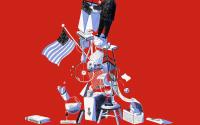Thursday 23 October 2008
by: Michael M. Grynbaum, The New York Times
Facing a firing line of questions from Washington lawmakers, Alan Greenspan, the former Federal Reserve chairman once considered the infallible maestro of the financial system, admitted on Thursday that he "made a mistake" in trusting that free markets could regulate themselves without government oversight.
A fervent proponent of deregulation during his 18-year tenure at the Fed's helm, Mr. Greenspan has faced mounting criticism this year for having refused to consider cracking down on credit derivatives, an unchecked market whose excesses partly led to the current financial crisis.
Although he defended the use of derivatives in general, Mr. Greenspan, who left office in 2006, told members of the House Committee of Government Oversight and Reform that he was "partially" wrong in not having tried to regulate the market for credit-default swaps.
But in a tense exchange with Rep. Henry A. Waxman, the California Democrat who is chairman of the committee, Mr. Greenspan conceded a more serious flaw in his own philosophy that unfettered free markets sit at the root of a superior economy.
"I made a mistake in presuming that the self-interests of organizations, specifically banks and others, were such as that they were best capable of protecting their own shareholders and their equity in the firms," Mr. Greenspan said.
Referring to his free-market ideology, Mr. Greenspan added: "I have found a flaw. I don't know how significant or permanent it is. But I have been very distressed by that fact."
Mr. Waxman pressed the former Fed chair to clarify his words. "In other words, you found that your view of the world, your ideology, was not right, it was not working," Mr. Waxman said.
"Absolutely, precisely," Mr. Greenspan replied. "You know, that's precisely the reason I was shocked, because I have been going for 40 years or more with very considerable evidence that it was working exceptionally well."
The oversight committee is holding hearings to determine what gaps in the regulatory structure abetted the crisis that has roiled the world's financial markets.
Mr. Greenspan appeared alongside Christopher Cox, the chairman of the Securities and Exchange Commission, and John W. Snow, who served as secretary of the Treasury early in the Bush administration.
In his prepared remarks, Mr. Greenspan said he was in "a state of shocked disbelief" about the breakdown in the ability of banks to regulate themselves. He also warned about the economic consequences of the crisis, saying that he "cannot see how we will avoid a significant rise in layoffs and unemployment." Consumer spending will decline, too, he said, adding that a stabilization of home prices would be necessary to bring the crisis to its end.
Saying that his thinking "has evolved" in the last year, Mr. Greenspan also defended his record. "In 2005, I raised concerns that the protracted period of underpricing of risk, if history was any guide, would have dire consequences," he said. "This crisis, however, has turned out to be much broader than anything I could have imagined."






